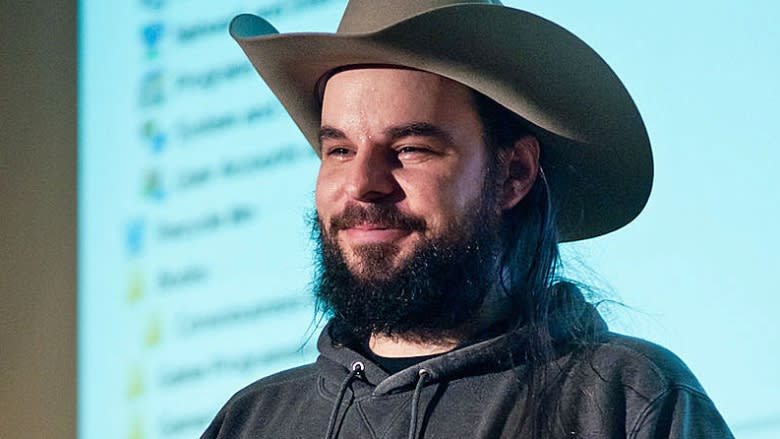N++, the 'perfect' video game that took 10 years to complete
N++, a new video game for PlayStation 4, is the culmination of over a decade of work.
Created by the inventers of N and N+ — Metanet Games, the twin dynamos of Mare Sheppard and Raigan Burns who helped put Toronto's indie game industry on the map a decade ago — N++ is not just inventive and pleasing to the senses.
It also has the audacity to set itself up as a game that creative users might play for many years to come.
"The whole premise of the project was that we never want to make another one," Burns told CBC News. "We want this to be definitive, and to last a lifetime."
The premise of N++ is as straightforward as its minimalistic visual style.
The player controls a tiny stick-figure ninja who must run, jump and slide past innumerable death traps such as mines, homing missiles and electrified robots to reach a switch that opens a door somewhere in the level.
Reach the door alive within the time limit, and you win.
Every level takes up only a single screen, but that doesn't mean the game is short.
Sheppard and Burns, along with programmer Shawn McGrath, painstakingly created 2,360 levels for N++.
Throw in a level editor that players can use to create their own challenges, and this becomes a game that you can play for the rest of your life.
The scope of N++ is indicative of Metanet's dedication to making this its most perfect, most comprehensive game possible.
Its predecessor, N, was a free browser-based game released in 2004, long before games on Facebook or mobile phones were ubiquitous.
A follow-up, N+, was released on the Xbox 360 in 2008.
Critical response to N++ so far seems to have achieved Metanet's goals.
The National Post's Chad Sapieha wrote that it feels like "the perfect indie platformer: A pleasure to the senses, challenging without being frustrating, cooperative, competitive, creative, and empowering."
It currently enjoys an 83 average on Metacritic.
Growing the N audience
While N and N+ had a cult following and had been played hundreds of thousands of times, they never reached the audience that Burns and Sheppard felt it could.
"We were trying to take a stand against overly decorative games" with N and N+, says Sheppard, adding that, as a result, the original N "was maybe a game that kept you at arm's length."
So they sought to change that with N++, and that meant treading into unfamiliar territory.
First and foremost, that meant adding colour and music to the template, something they had actively avoided in the past.
Players can now choose from a wide variety of colour schemes, turning the default grey and black tones (the only colours in N and N+) to palettes with hot pink, turquoise or even stark black and white meant to simulate graphics from the 1980s.
It's all set to a six-hour-long mellow electronica soundtrack.
The new colours and music were carefully chosen so as to complement the core experience, not ruin it "Jar Jar Binks-style," according to Burns.
Toronto indie games
Today, Toronto is one of the most well-known hubs of game development — especially independent games — in Canada.
But it wasn't always so, and many creators credit that change specifically to Sheppard and Burns when they made N.
In the early 2000s, aspiring game developers hoped to work for a large game company like Electronic Arts or Ubisoft. A small handful of independent studios, including Metanet in Toronto, changed the perceptions of what was possible outside of that business model.
"There are some landmark games not only in Toronto, but in the industry, that wouldn't have existed, I don't think, if Raigan and Mare didn't show up," says Jonathan Mak, creator of the critically acclaimed Everyday Shooter and Sound Shapes.
When N+ launched on Xbox 360, Nathan Vella of the then-struggling Capy Games realized that it was possible to make the kinds of games he wanted for a living. "It literally inspired us to turn the company 180 degrees and say, 'We're just going to follow Metanet's lead, and make the stuff that we believe in.'"
Capy would go on to make award-winning games like Superbrothers: Sword and Sworcery EP and Super T.I.M.E. Force. Their next game, a moody spelunking adventure called Below, is due out later this year.
"The foundation of that snowball we pushed down the hill was being inspired by Mare and Raigan, and Jon Mak as well," says Vella.
Sheppard and Raigan are also founding members of the Hand Eye Society, a Toronto group that works towards showcasing games as a form of creative expression, and giving aspiring developers and artists the tools to make the kinds of games they've dreamed of making — just like Metanet when it began.



